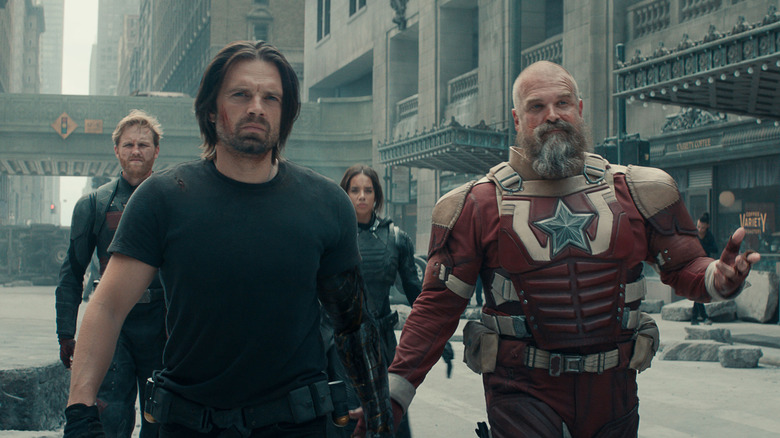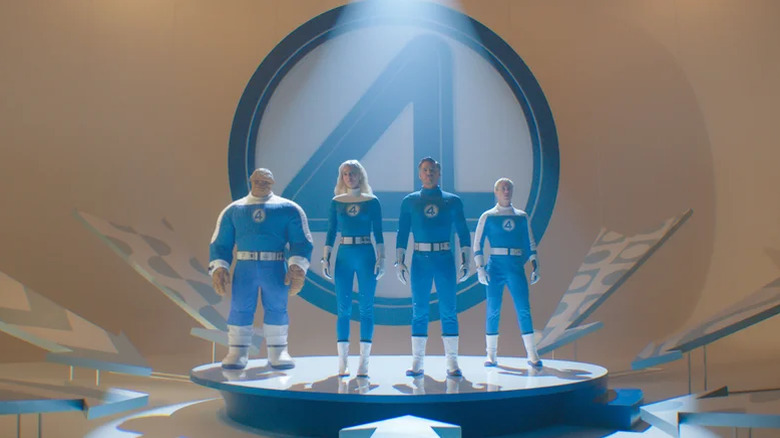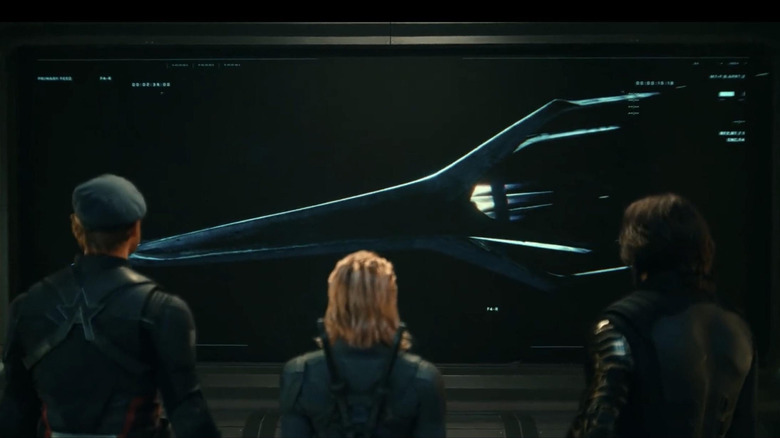Why Marvel's Thunderbolts* Post-Credits Scene Didn't Connect To Fantastic Four
"Thunderbolts*" is one of the best movies Marvel Studios has produced since "Avengers: Endgame," a truly marvelous film that brings together characters from across the Marvel Cinematic Universe in a seamless way. Truly, this movie feels the closest to the achievement of the first "The Avengers" since it brings together characters not from the highest-grossing movies everyone already watched, but rather characters from forgotten sequels, straight-to-Disney+ movies, and TV spin-offs. That the team comes together as well as it does, and that the narrative both pays off their individual titles while also serving as a great standalone story, is a testament to the writing and directing of the movie.
Not only is "Thunderbolts*" a reminder that Marvel is at its best when it's about team-ups, but it's also a movie that has a fantastic post-credits scene. It actually feels like something that will pay off because it's essentially a tease for "Fantastic Four: First Steps." Except, that's not exactly true; nothing in the "Thunderbolts*" post-credits scene actually connects to "First Steps." That's because, as "Fantastic Four: First Steps" director Matt Shakman told Cinemablend, the post-credits scene was made after work had mostly ended on "First Steps."
"That was not something that I was familiar with because it hadn't been created at the time that I was working on my script," Shakman said. "I often use the metaphor of it's, you know, like a relay race, right? You pass the baton, you run your section of it as hard and fast as you can, do the best you can with your version of Fantastic Four — Earth 828, this world — and then you pass the baton, in this case to the Russo brothers."
The art of the post-credits scene
The post-credits scene of "Thunderbolts*" teases an upcoming conflict between The Avengers and the New Avengers. This is due to the new Captain America, Sam Wilson, suing the team formerly known as the West Chesapeake Valley Thunderbolts for taking the name of the Earth's Mightiest Heroes. While the New Avengers consider extremely silly alternatives (such as calling themselves New Avengerz), the arguments over what to do about the team's name are interrupted by the arrival of an unknown object from space. The scene ends with Yelena (Florence Pugh) and the rest of the New Avengers watching a screen showing the Fantastic Four's heavily damaged spaceship approaching Earth.
The scene was significant because it was the first time in years that a post-credits scene in a Marvel movie felt meaningful and worth watching. The arrival of the Fantastic Four in the main Marvel universe was not an empty promise for a cool cameo that will probably never come to fruition — remember The Black Knight, Eros, Hercules, or Clea? Instead, "Thunderbolts*" delivered a post-credits scene that felt tangible, a tease for both the very next Marvel movie ("First Steps") and for the plot of "Avengers: Doomsday." It was like when "Captain America: The First Avenger" featured the teaser trailer of "The Avengers" after the credits. That the scene was ultimately unrelated to the actual plot of "Fantastic Four: First Steps" is a sign of things to come for the MCU.
Marvel without connectivity
The Marvel Cinematic Universe is making big changes moving forward. Kevin Feige blamed the box office failure of "Thunderbolts*" on people's unfamiliarity with the characters and the fact that fans thought they needed to catch up on lesser-seen movies and TV shows to watch the movie. Though there was no need to do any of that, the lackluster box office of the movie supports Feige's point. In light of that, the MCU is drawing back on interconnectivity going forward.
So, what is the role of a post-credits scene in a Marvel Cinematic Universe where you don't have to watch everything? Perhaps it should be like the "Thunderbolts*" post-credits scene, a tease barely related to "Fantastic Four" but that nevertheless enticed fans to see it. It's likely the scene is more akin to the end of "Thor: Ragnarok," which led right into "Infinity War" with the latter movie showing the aftermath of the way the former ended. There is no point in introducing things in post-credits scenes that fans may not see for years (if ever). Rather, have the scenes play out as a way to entice fans for what is actually right around the corner.


